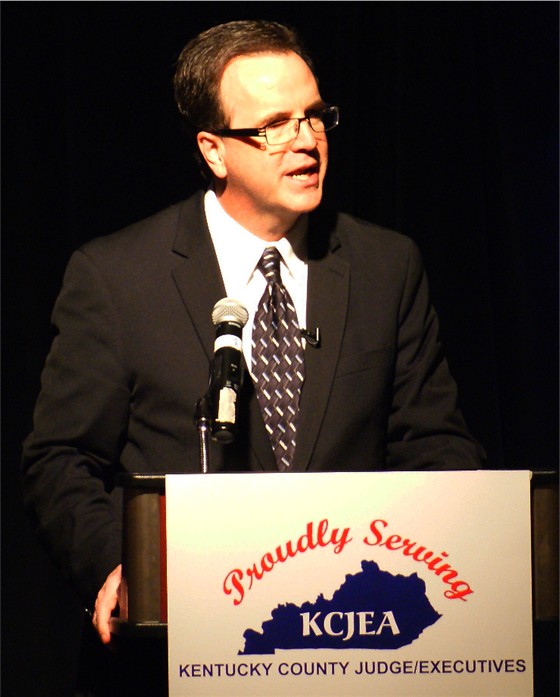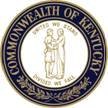Issues with transfer of funds to UI account among Auditor’s concerns in 2015 report
FRANKFORT, Ky. (February 4, 2016) – Mike Harmon, Kentucky’s 47th Auditor of Public Accounts (APA), today released the first volume of the annual statewide audit of the Commonwealth of Kentucky for the Fiscal Year ended on June 30, 2015.

Auditor Mike Harmon speaks to the Kentucky County Judge Executives Association in Lexington on February 3rd. Auditor Harmon released the first volume of the annual Single Statewide Audit of Kentucky (SSWAK) today, which is a statewide audit of the Commonwealth of Kentucky. (Office of the Auditor of Public Accounts)

“It is always imperative for state government to operate as efficiently as possible with the proper safeguards and measures in place,” said Auditor Harmon in releasing the report. “This annual audit is one way we seek to identify issues within state government, and to provide guidance and discussion with agencies on how to best address them.”
The first volume of the Statewide Single Audit of Kentucky (SSWAK) contains financial statement findings from the APA’s audit of the Comprehensive Annual Financial Report (CAFR) and the Schedule of Expenditures of Federal Awards (SEFA).
The Fiscal Year 2015 SSWAK Volume One contains 45 findings with recommendations, involving 14 state agencies. Two of the findings were considered material weaknesses, and several are matters that have not been addressed from prior year SSWAK audits.
One of the most significant findings includes an incident where leadership in the Department for Workforce Investment, in an attempt to ensure the Unemployment Insurance (UI) Trust Fund had a positive balance before a Federal Review on November 10, 2015, transferred $20 million in restricted funds to the UI Trust Fund in August of last year, calling it an investment.
Finding 2015-001 states the transfer was approved by Department for Workforce Investment management outside of the normal control structure, policies, and procedures, and without the immediate knowledge of those assigned to oversee the UI Trust Fund. During interviews conducted by our office, Department for Workforce Investment management indicated the transfer was done to secure tax savings for Kentucky businesses of $165 million in future tax credits for the Federal Unemployment Tax Act (FUTA), and their intention was to recover the transferred funds.
After our office informed management their action did not comply with KRS Chapter 341, Department for Workforce Investment management initiated a correction to have the $20 million surcharge investment refunded from the US Treasury’s Unemployment Trust Fund.” The department acknowledged the transfer was done in error and followed guidance from the federal government to address the deficiency.
“While, in their own opinion, taking action to transfer $20 million into the UI Trust Fund was well intended, it wasn’t in line with established policy and Kentucky law,” Auditor Harmon said. “Because of the issues raised in the report, our office will refer it to the U.S. Department of Labor.”
In addition, the SSWAK report contains a finding that involves the Kentucky Medicaid Management Information System (KMMIS) and issues with data being submitted by Managed Care Organizations (MCOs) that was not consistently in compliance with the terms of their contracts. Finding 2015-007 stated that because the MCOs are not consistently submitting and correcting the data it cannot be determined that information within KMMIS related to the MCOs is complete and accurate. In the agency’s response, the Department for Medicaid Services stated that it began penalizing MCOs for their non-compliance effective July 1, 2015.
The complete SSWAK report, along with the responses to the findings from the various state agencies, can be found on the Auditor’s website: www.auditor.ky.gov. Volume 2 of the SSWAK dealing with federal compliance among state agencies will be released in March.
The Auditor of Public Accounts ensures that public resources are protected, accurately valued, properly accounted for, and effectively employed to raise the quality of life of Kentuckians.










